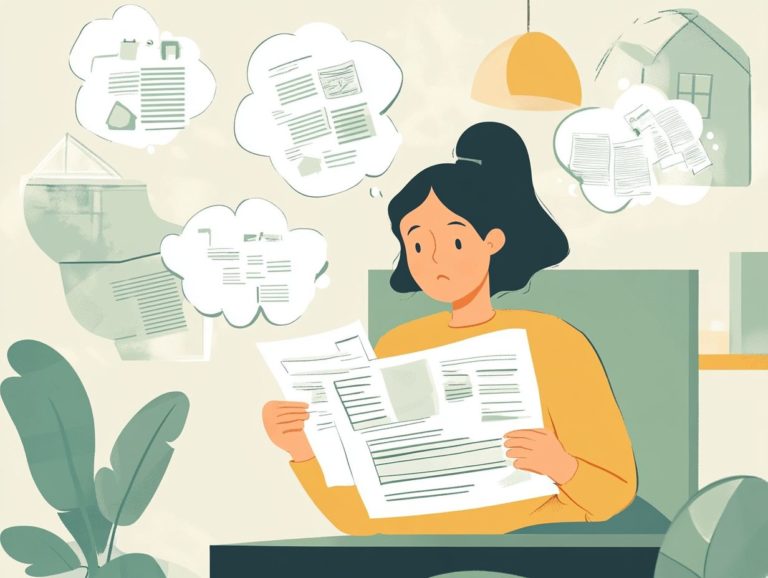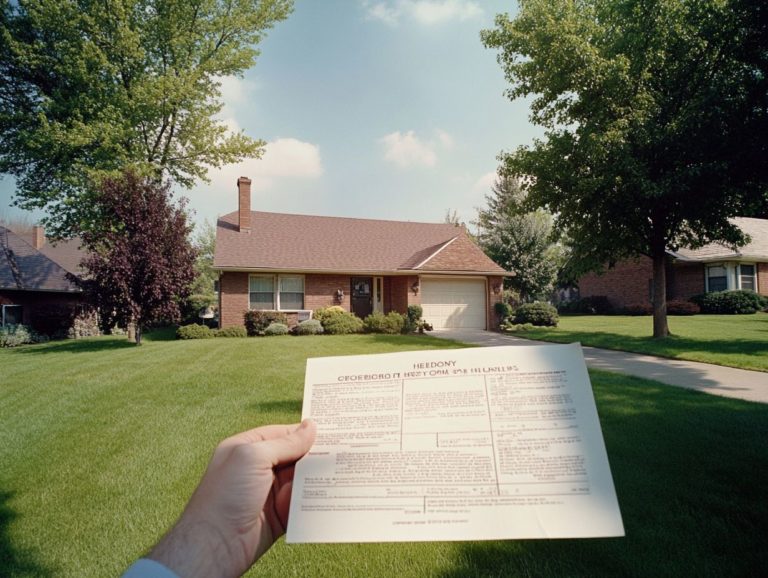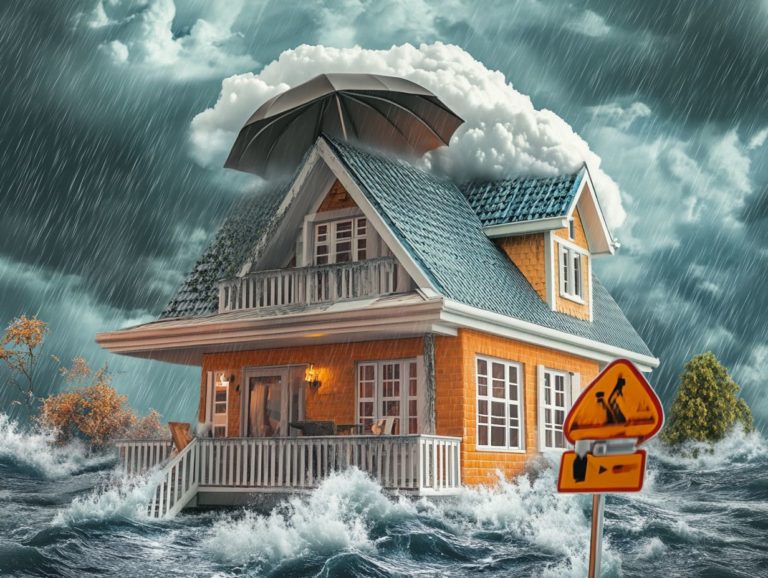5 Must-Ask Questions About Your Home Policy
Navigating the realm of home insurance may seem daunting, yet grasping the nuances of your policy is vital for safeguarding your investment!
This article presents 15 essential questions every homeowner should contemplate. From understanding the specifics of what your policy covers to the process of filing a claim, it skillfully guides you through the complexities of home insurance.
Whether you’re seeking strategies to reduce your premiums or clarifying details about personal property coverage, this comprehensive guide equips you with the insights necessary for making informed decisions.
Immerse yourself in this knowledge and empower yourself with the information essential for achieving peace of mind.
Contents
- Key Takeaways:
- 1. What Does My Home Policy Cover?
- 2. Are There Any Exclusions or Limitations?
- 3. How Much Coverage Do I Need?
- 4. What Are the Deductibles and Premiums?
- 5. How Do I File a Claim?
- 6. What Happens If I Need to Make Changes to My Policy?
- 7. Are There Any Discounts Available?
- 8. How Often Should I Review and Update My Policy?
- 9. What Happens If My Home Is Damaged or Destroyed?
- 10. Is My Personal Property Covered?
- 11. Are There Any Additional Coverages I Can Add?
- 12. What Is the Difference Between Replacement Cost and Actual Cash Value?
- 13. How Can I Lower My Home Insurance Premiums?
- 14. How Does Location Affect My Home Insurance?
- 15. What About Home-Based Businesses?
- Frequently Asked Questions
Key Takeaways:
- Know exactly what your home policy covers to avoid surprises when you need it most!
- Be aware of any exclusions or limitations in your policy to ensure you have adequate coverage for potential risks.
- Consider factors such as the value of your home and personal belongings when determining how much coverage you need.
1. What Does My Home Policy Cover?
Homeowners insurance is your shield against a multitude of risks. It offers strong protection for your home and personal belongings against unexpected events like weather damage, theft, and liability claims.
It s crucial for you, as a homeowner in Albany, Schenectady, Troy, and the surrounding areas, to fully grasp what your home insurance policy covers. This knowledge empowers you to make informed choices about your coverage options.
Typically, your policy includes:
- Dwelling coverage for the physical structure
- Personal property coverage for your cherished belongings
- Liability coverage that helps if someone gets hurt on your property
Dwelling coverage specifically addresses the costs associated with repairs or rebuilding your home. This is particularly vital in areas susceptible to flooding or severe storms.
Personal property coverage extends its protective embrace to everything within your home from furniture to electronics ensuring you can replace essential items if they are stolen or damaged.
Liability coverage acts as your safety net. It can potentially cover legal fees and medical expenses if someone gets injured on your property. Considering the unique challenges posed by local environmental factors, it’s imperative for you to regularly review your policy to ensure that your coverage is adequate and aligns perfectly with your specific risks and needs.
2. Are There Any Exclusions or Limitations?
Understanding the exclusions and limitations of your home insurance policy is essential. These factors outline the events or damages that aren t covered, potentially leaving you vulnerable in certain situations.
Common exclusions, such as damage caused by floods, are often absent from standard policies. Issues stemming from wear and tear and neglect are also typically excluded. Such limitations can create significant financial challenges if you encounter events like a severe storm that floods your property.
For instance, if you neglect your roof, resulting in leaks that cause extensive water damage, your insurance claims could be denied due to neglect.
To minimize these risks, it s prudent for you to consider purchasing separate flood insurance, which protects against damage caused by flooding. Investing in regular home maintenance is also wise. This ensures that you have strong protection for your property, no matter the scenario.
3. How Much Coverage Do I Need?
Determining the right amount of homeowners insurance coverage is crucial for establishing a robust financial safety net. This safety net will safeguard your home and personal property in the face of unexpected disasters or unforeseen events.
Several factors can significantly influence the level of coverage you need. For instance, consider the value of your home, including its structural components and any upgrades or renovations you’ve made. To better protect your investment, explore 5 ways to customize your home insurance policy.
It’s also important to evaluate your personal property within the home. Think about your valuables and everyday items to paint a comprehensive picture of potential losses. Additionally, don’t overlook common home insurance FAQs regarding additional living expenses that may arise if your home becomes temporarily uninhabitable, as these costs are essential to factor in for thorough protection.
To accurately assess your home’s worth and select an appropriate homeowners policy, enlisting a professional appraisal service is highly recommended. This proactive step not only provides peace of mind but also enhances your financial security when you need it most.
Regularly review your policy to make sure it meets your needs and protects your investment!
4. What Are the Deductibles and Premiums?
Understanding the relationship between deductibles and premiums is essential for you as a homeowner. These two factors significantly impact your overall costs and influence how much you ll need to pay out-of-pocket during the claims process.
Deductibles play a crucial role in homeowners insurance. They determine the initial amount you must cover before your insurance steps in during a claim. Opting for a higher deductible can often lead to lower premiums. This can be tempting if you’re looking to save on monthly expenses.
However, it s vital to carefully assess your financial situation. Selecting a deductible that strains your budget in the event of a loss could lead to unnecessary financial stress. Striking the right balance between premium savings and potential out-of-pocket expenses is key.
Consider your emergency funds and the likelihood of filing a claim when determining the most suitable deductible for your needs.
5. How Do I File a Claim?
Filing a claim can feel overwhelming for homeowners, but grasping the claims process can significantly lighten the load. It ensures you receive the assistance you need promptly after an incident.
To start, it s essential to thoroughly document any damages. Take clear photographs and compile a detailed list of the affected items. This initial step helps build a robust case and serves as a handy reference throughout your claims journey.
Next, reach out to your homeowner’s insurance company. This usually means a phone call or submitting an online form to formally initiate the claim.
Once you’ve notified your insurer, working closely with claims assistance representatives will clarify the necessary paperwork and steps involved. This makes the process feel much smoother and less intimidating for you.
6. What Happens If I Need to Make Changes to My Policy?
Changes to your homeowners insurance policy may be necessary as your circumstances evolve. This can happen whether you’re renovating, acquiring new personal property, or exploring 5 things you didn’t know about home insurance and seeking additional coverage options.
Understanding how to navigate these adjustments is essential for maintaining adequate protection. Consider this: you might decide to upgrade your space to include a home office. This introduces valuable equipment that needs extra coverage.
Life events, such as marriage or welcoming children, often prompt individuals to seek enhanced protection for their family and belongings.
Connect with an independent insurance agency to effectively assess your changing needs. They can review your existing policy, identify gaps in coverage, or highlight areas where adjustments might be necessary.
This proactive approach ensures your policy reflects your current situation and provides peace of mind against potential risks.
7. Are There Any Discounts Available?
Homeowners like you can seize amazing discounts available through your homeowners insurance. This offers a chance to save money while ensuring comprehensive coverage for your property.
These discounts can vary significantly from bundling multiple insurance policies, like combining your home and auto insurance, to installing safety features such as security systems or smoke alarms.
Keeping a strong insurance score can also lead to substantial reductions in your premiums. It s crucial for you to proactively engage with your insurance providers. Many agencies offer tailored discounts that might not be readily advertised.
By taking this initiative, you can maximize your savings while still securing the best possible protection for your investments.
8. How Often Should I Review and Update My Policy?
Regularly reviewing and updating your homeowners insurance policy is crucial. This ensures that your coverage remains relevant and sufficient as your circumstances evolve over time, especially considering the 5 must-have features in home insurance policies.
Life is full of unexpected twists, from major renovations that boost your home’s value to acquiring new personal property, all of which can significantly impact your risk exposure. Be particularly proactive after these changes; they often call for adjustments in liability coverage or property protection.
Engaging with your insurance provider clarifies what is covered and uncovers any gaps that may have arisen due to shifts in your lifestyle or assets. This proactive approach ensures that you are safeguarded against potential risks, aligning your insurance to best suit your ever-changing needs.
9. What Happens If My Home Is Damaged or Destroyed?
If your home is damaged or destroyed, you need to understand your homeowners insurance coverage.
This knowledge is essential for a smooth recovery and restoration process.
Understand not just the primary structure of your home but also any additional structures like garages or sheds, which may be covered separately.
You should also be fully aware of the protection for your personal belongings. Contents coverage can greatly influence the financial outcome of a loss.
As you navigate the claims process, document damages and contact your insurance provider quickly for a faster assessment.
Review your policy to identify specific exclusions or limits. This helps you maximize your recovery during tough times.
10. Is My Personal Property Covered?
Understanding whether your personal property is covered under your homeowners insurance policy is crucial; it can significantly influence your financial recovery in the event of theft, damage, or loss. Here are 5 things to know about local home insurance providers that can help you make informed decisions.
Typically, homeowners insurance includes personal property coverage, protecting belongings like furniture, electronics, and clothing from specific risks such as fire, vandalism, or natural disasters.
However, limits and exclusions often apply. High-value items like jewelry or art may not receive full coverage unless you add additional endorsements, which are extra coverage options.
Document your valuable possessions by taking photographs and keeping receipts to verify their worth and ensure you have adequate coverage.
Know the specific limits on personal property. This knowledge can make a considerable difference during the claims process and allow for quicker recovery when you need it the most.
11. Are There Any Additional Coverages I Can Add?
As a homeowner, you can enhance your insurance policy with additional coverages, providing robust protection for specific risks that standard coverage might overlook.
If you live in an area prone to heavy rainfall or rising water levels, adding flood insurance is a wise decision to shield yourself from significant financial losses.
If your home is in a region that faces the threat of sewer backups, investing in water backup coverage is invaluable, as it covers damage from clogged drains or overflow.
Ordinance or law coverage can be particularly advantageous when local building codes evolve post-disaster. It allows you to rebuild to current standards without bearing out-of-pocket expenses.
These additional coverages are vital tools for managing unforeseen events and safeguarding your financial investments.
12. What Is the Difference Between Replacement Cost and Actual Cash Value?
Understanding the difference between replacement cost and actual cash value is essential for you as a homeowner.
It ensures that you receive proper compensation for any damages to your property under your insurance policy.
Replacement cost coverage means you’ll get the amount needed to replace or repair items with new ones of similar type and quality, without factoring in depreciation.
In contrast, actual cash value accounts for depreciation, meaning the payout will reflect the item’s current market value at the time of the loss.
For instance, if your roof is damaged, replacement cost insurance would cover the entire expense of installing a new roof.
Actual cash value would only reimburse you for the diminished worth of the damaged roof, potentially leaving you with significant out-of-pocket costs.
13. How Can I Lower My Home Insurance Premiums?
Want to lower your home insurance costs? Start by reviewing your current policy to find savings.
Increasing your deductibles can help, but remember you’ll pay more out of pocket if you file a claim.
Adding safety features like smoke detectors and burglar alarms can also decrease your premiums.
Always ask about discounts! Many insurers offer lower rates for bundling policies or upgrading safety measures.
By taking these steps, you can save big without losing essential coverage.
14. How Does Location Affect My Home Insurance?
Your home’s location plays a big role in determining your insurance premiums. Different areas have unique risks that insurers consider.
For example, living in a hurricane-prone area usually means higher premiums due to storm damage risks.
Crime rates can also impact your rates, as higher crime often leads to increased costs.
If you live near flood zones, standard policies may not provide enough coverage, so consider specialized flood insurance.
Review these local risks closely to ensure your coverage meets your needs.
15. What About Home-Based Businesses?
Running a business from home can create unique insurance challenges. Standard homeowners policies often don t cover business-related risks.
Reassess your insurance needs, especially if clients visit or you use business equipment at home.
Understanding your coverage options is crucial, particularly regarding business liability, which protects against legal claims.
Working with an independent insurance agent can give you tailored advice and solutions to protect your personal and business assets.
Frequently Asked Questions
What is a Home Policy?
A home policy is insurance that covers your home and personal belongings against damage or loss. It protects your investment and provides financial security during unexpected events like disasters or theft.
What does a Home Policy Typically Cover?
A home policy typically covers your home’s structure, personal belongings, liability for injuries or damages to others, and additional living expenses if your home becomes uninhabitable. However, the coverage may vary depending on your specific policy, so it’s important to review it carefully.
What Factors Can Affect My Home Policy’s Premium?
Several factors can affect your home policy’s premium, including your home’s location, size, age, construction materials, and the level of protection you have, such as security systems. To better understand these elements, consider the 5 things to know before buying home insurance, which may also include factors like your credit score, claims history, and the deductible amount you choose.
What is a Deductible and How Does it Work?
A deductible is the amount you agree to pay out of pocket before your insurance coverage kicks in. For example, if you have a $500 deductible and file a claim for $2,000 in damages, you will pay the first $500, and the insurance company will cover the remaining $1,500. A higher deductible can lower your premium, but it also means you’ll pay more if you have a claim.
Are There Any Exclusions or Limitations in My Home Policy?
Yes, your home policy may have exclusions and limitations. For example, flood and earthquake damages are often not covered, so you might need separate insurance for these events.
It’s essential to review your policy carefully. Understanding these exclusions helps you avoid surprises later.
How Often Should I Review and Update My Home Policy?
Review your home policy at least once a year, and consider the 5 reasons to review your home insurance policy whenever you make significant changes, like renovations or adding new rooms.
Also, check your policy if you get valuable items that need extra insurance. Life changes, such as marriage or having children, are good reasons to revisit your coverage.






